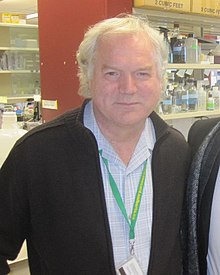Michael Houghton | |
|---|---|
 Houghton in 2017 | |
| Born | 1949 (age 74–75) |
| Alma mater | University of East Anglia (BSc) King's College London (PhD) |
| Known for | Hepatitis C Hepatitis D |
| Awards | Karl Landsteiner Memorial Award (1992) Robert Koch Prize (1993) William Beaumont Prize (1994) Lasker Award (2000) Gairdner Foundation International Award (2013 – declined) Nobel Prize for Medicine (2020) |
| Scientific career | |
| Fields | Microbiology Virology |
| Institutions | University of Alberta Chiron Corporation |
| Thesis | RNA Polymerases and Transcription in the Chicken Oviduct (1977) |
| Doctoral advisors | Norman Carey and James Chesterton[1] |
| Website | apps |
Sir Michael Houghton (born 1949) is a British scientist and Nobel Prize laureate. Along with Qui-Lim Choo, George Kuo and Daniel W. Bradley, he co-discovered Hepatitis C in 1989.[2] He also co-discovered the Hepatitis D genome in 1986.[3] The discovery of the Hepatitis C virus (HCV) led to the rapid development of diagnostic reagents to detect HCV in blood supplies, which has reduced the risk of acquiring HCV through blood transfusion from one in three to about one in two million.[4][5] It is estimated that antibody testing has prevented at least 40,000 new infections per year in the US alone and many more worldwide.[6]
Houghton is currently Canada Excellence Research Chair in Virology and Li Ka Shing Professor of Virology at the University of Alberta, where he is also director of the Li Ka Shing Applied Virology Institute.[7] He was the co-recipient of the 2020 Nobel Prize in Physiology or Medicine along with Harvey J. Alter and Charles M. Rice.[8][9]
- ^ "Michael Houghton Biographical". Nobel Prize. Retrieved 17 May 2024.
- ^ Choo QL, Kuo G, Weiner AJ, Overby LR, Bradley DW, Houghton M (April 1989). "Isolation of a cDNA clone derived from a blood-borne non-A, non-B viral hepatitis genome". Science. 244 (4902): 359–62. Bibcode:1989Sci...244..359C. CiteSeerX 10.1.1.469.3592. doi:10.1126/science.2523562. PMID 2523562.
- ^ Wang, KS; Choo, QL; Weiner, AJ; Ou, JH; Najarian, RC; Thayer, RM; Mullenbach, GT; Denniston, KJ; Gerin, JL; Houghton, M (9 October 1986). "Structure, sequence and expression of the hepatitis delta (delta) viral genome". Nature. 323 (6088): 508–14. Bibcode:1986Natur.323..508W. doi:10.1038/323508a0. PMID 3762705. S2CID 4265339.
- ^ "Opinion: Nobel-worthy discovery right in our backyard". Canadian for Health Research. Retrieved 4 September 2016.
- ^ Semeniuk, Ivan (20 March 2013). "Science world abuzz as virologist turns down Gairdner award". The Globe and Mail. Retrieved 10 September 2016.
- ^ Thompson, Gilbert (2014). Pioneers of Medicine Without a Nobel Prize. World Scientific. p. 209. ISBN 978-1-78326-386-8.
- ^ "MMI Faculty – Michael Houghton, PhD". Retrieved 13 January 2014.
- ^ "Press release: The Nobel Prize in Physiology or Medicine 2020". Nobel Foundation. Retrieved 5 October 2020.
- ^ Wu, Katherine J.; Victor, Daniel (5 October 2020). "Nobel Prize in Medicine Awarded to Scientists Who Discovered Hepatitis C Virus – Harvey J. Alter, Michael Houghton and Charles M. Rice were jointly honored for their decisive contribution to the fight against blood-borne hepatitis, a major global health problem". The New York Times. Retrieved 6 October 2020.